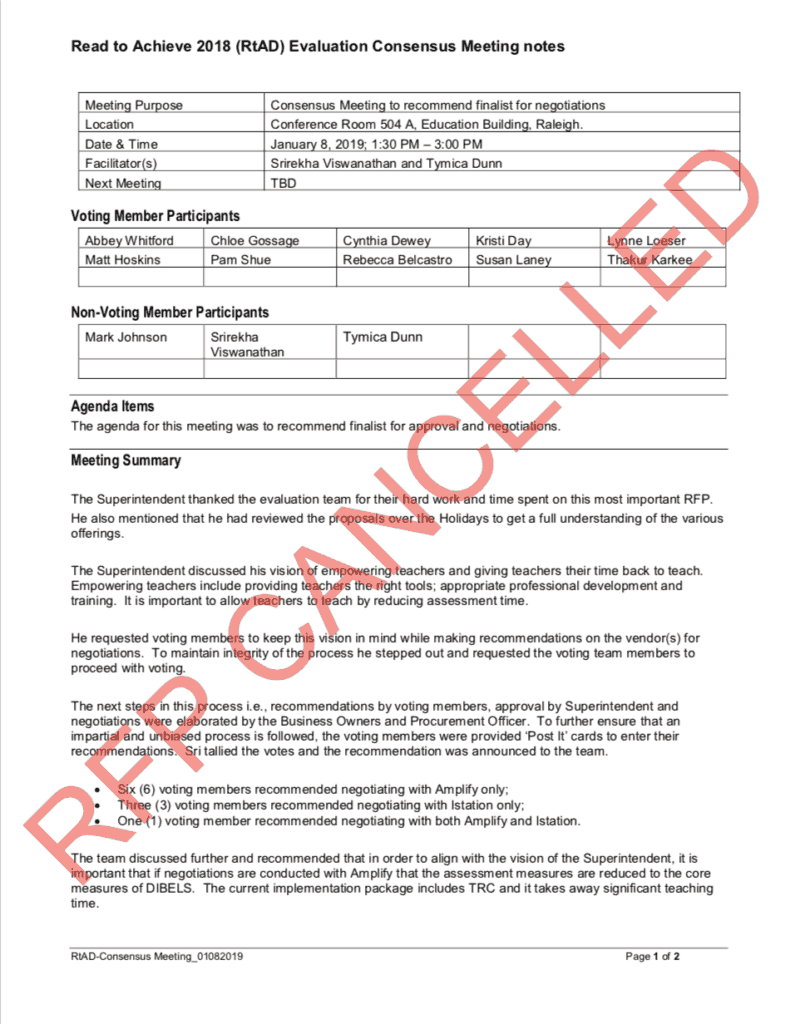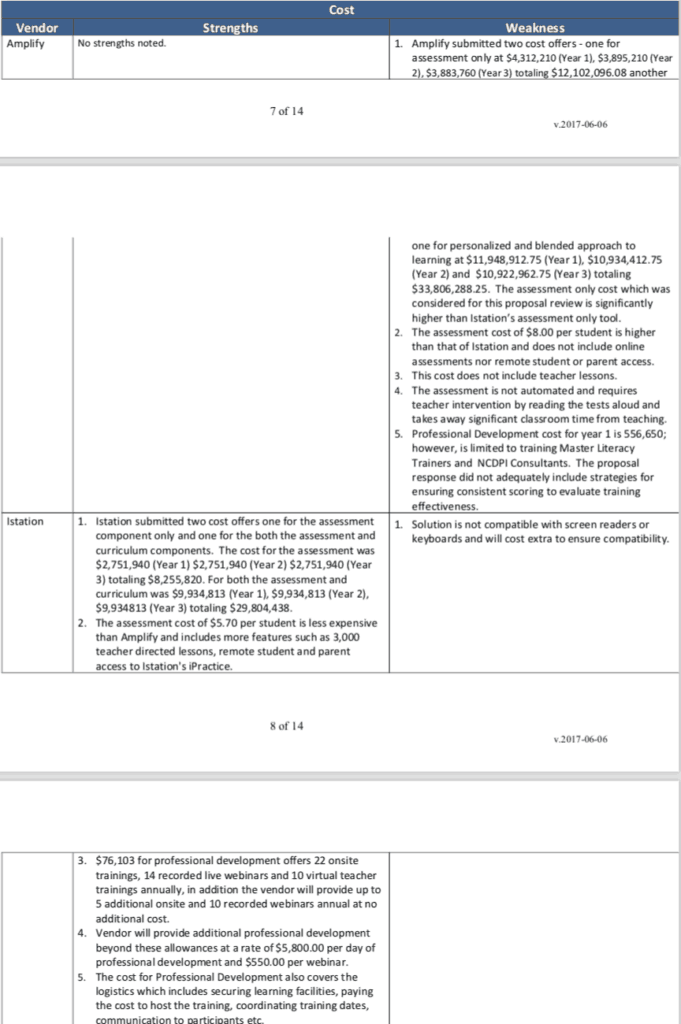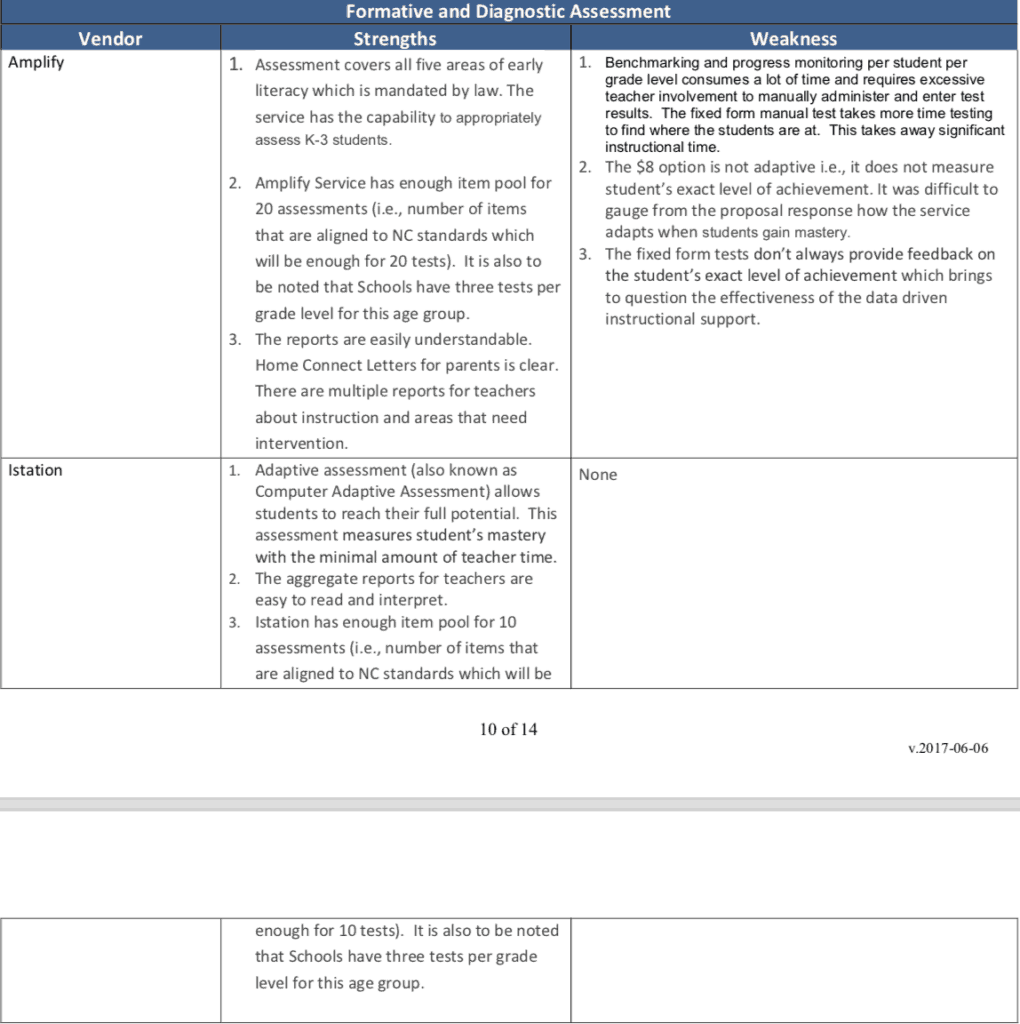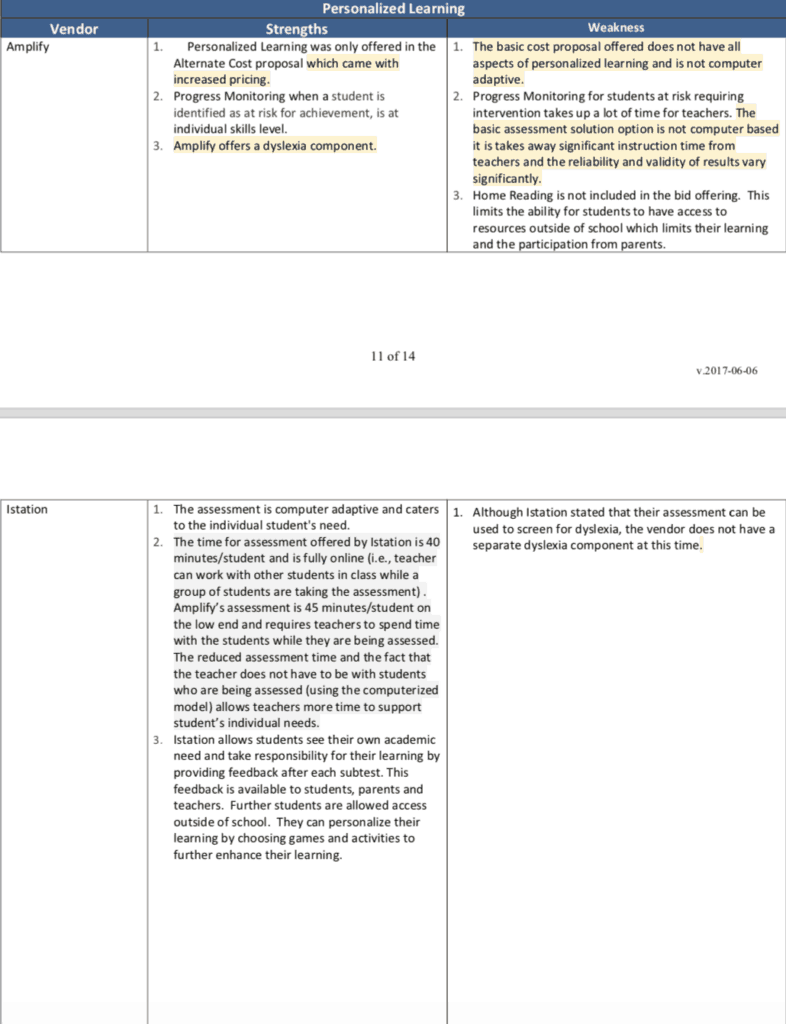

Department of Public Instruction (DPI) documents released Friday outline the process that led to Superintendent of Public Instruction Mark Johnson’s June announcement that K-3 classrooms across the state would use a new vendor to measure student literacy in the upcoming school year. Some of the documents appear to contradict Johnson and DPI’s insistence that no clear recommendation was made from the evaluation team deciding on a vendor. The entire package of documents is embedded at the end of this post.
Since Johnson’s announcement, teachers and advocates have voiced concerns that the new vendor, Istation, is not developmentally appropriate for young children, lacks appropriate dyslexia screening measures, and would not provide reliable data to inform reading instruction. Amplify, the vendor the state has used since the start of Read to Achieve in 2013, filed a formal protest over the state’s decision, also raising concern about the RFP (request for proposal) cancellation in February 2019. Istation defended its platform, saying the protest was “frivolous” and claiming the company won the contract fair and square. Johnson presented an implementation timeline to the State Board of Education, which already approved the Istation pick, saying the state has begun training teachers on the new platform and will postpone formal collection of literacy data until January.
In a statement released with the documents on Friday, Johnson said Istation is the best choice for the state’s needs.
“Istation is the best reading diagnostic tool for North Carolina, and I believe using Istation will yield quality data that will better support success for our students, meeting students where they are and helping them grow, while also reducing the time teachers must spend testing students. DPI and the State Board adhered to all laws, rules, and policies during this procurement to ensure fairness and objectivity. We are excited about the end result of a partnership with Istation to support students and teachers across North Carolina.”
Questions were raised about the process that led to the Istation contract as Amy Jablonski, former DPI employee and current candidate for state superintendent, said the evaluation committee recommended to Johnson that the state stick with Amplify, citing a December 2018 meeting where she and others shared the evaluation team’s reasoning and recommended Amplify. Jablonski left the department at the end of December. DPI spokesperson Graham Wilson has denied that the evaluation team reached a consensus.
The documents include the presentation and rankings Jablonski referenced with Amplify as the team’s first recommendation and Istation as its second.
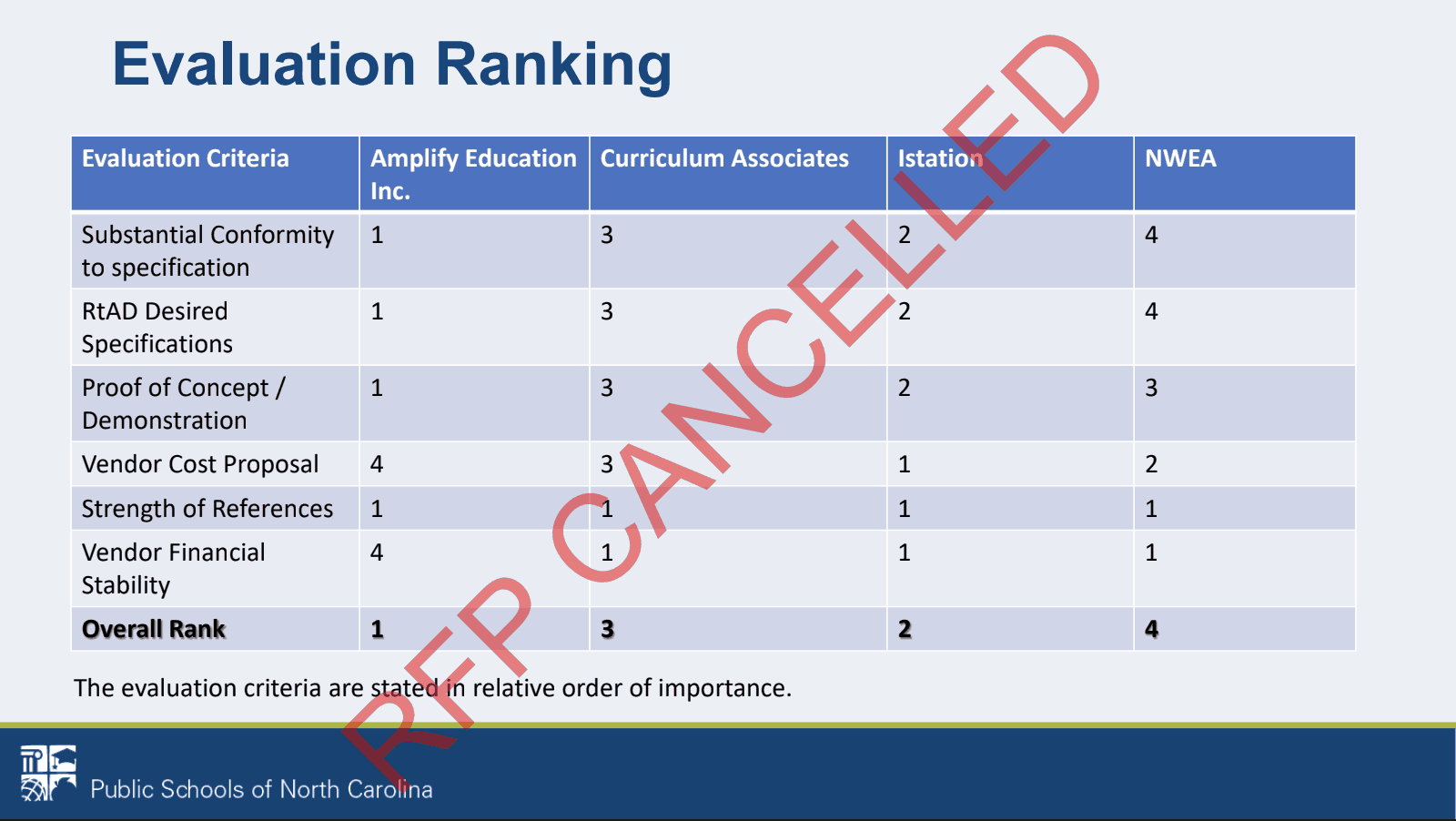

At the beginning of the package of released documents, Johnson states some of the documents, including the presentation above from December, lack information and were not updated since they were never publicly presented:
“In the case of the update presentation from December of 2018, the slides were not updated to correct misstatements of fact, missing information, or the Phase 1 rankings based on such misstatements because the presentation was never publicly delivered.”
Meeting notes from November 2018 state the team members ranked the four potential vendors on factors including “substantial conformity to solicitation specifications, RFP desired specification, proof of concept/demonstration, vendor cost proposal, vendor relevant experience and reference checks, and vendor financial stability.” At that meeting, members ranked Amplify as its first recommendation, Istation as its second, Curriculum Associates as its third, and NWEA as its fourth.
Meeting notes from January 2019 document a voting process where Johnson stepped out of the room and evaluation team members wrote their picks on sticky notes. According to the document, six voting members chose just to contract with Amplify, three voting members chose Istation only, and one voting member chose to contract with both vendors.
As the large red words printed across these documents note, the RFP process was cancelled in February. Meeting notes from March say then DPI General Counsel Jonathan Sink told the evaluation committee that the process was cancelled because “one of the voting members breached the confidentiality of the procurement process which jeopardized the legality of this procurement.” The next sentence of that document reads: “It should also be noted that the team did not reach unanimous consensus on the choice of the finalist vendors.”
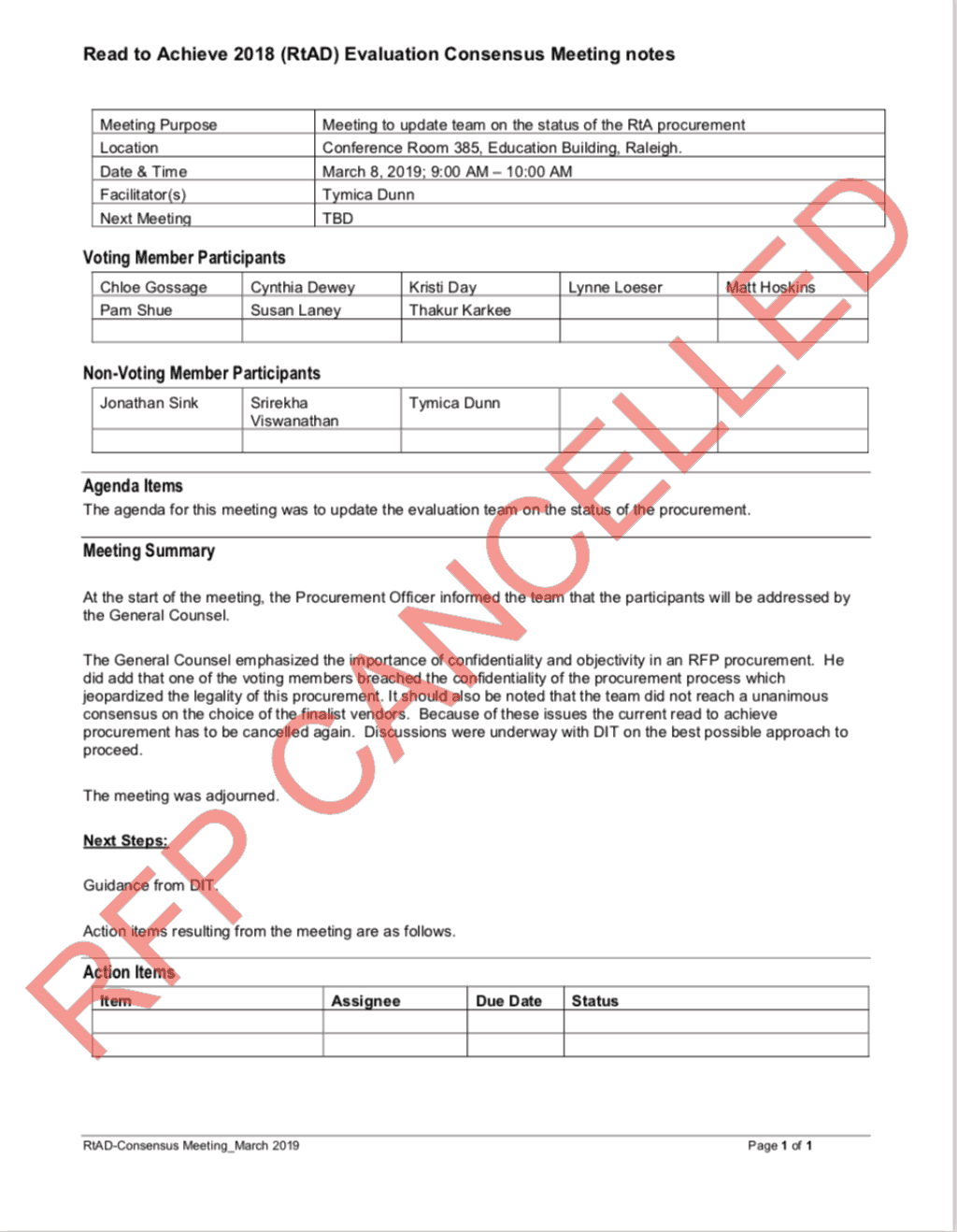

Wilson said in a comment Monday that an individual told DPI that an evaluation committee member did not disclose a former business relationship with Amplify. Wilson said Tuesday that this member, however, was part of an evaluation team that led to a prior RFP cancellation earlier in 2018, not the team described in the documents.
“A whistleblower informed DPI that one of the committee members failed to disclose that they had a prior business relationship with Amplify. Each committee member was required to sign a document stating that he or she did not have a conflict of interest in reviewing the product or service at hand. While this employee’s failure to disclose was part of a cancelled RFP, the Superintendent is pleased that the final decision resulted from a process that was fair and objective.
While state personnel laws prohibit us from saying who the employee was, I can tell you is that this person no longer works for DPI. We cannot overemphasize that the third and final step in the procurement process was legal, fair, and objective — and this was the process that led to the ultimate contract award.”
Also included in the released DPI documents is a June 7 contract award recommendation, which outlines the decision-making process after the February RFP cancellation. The document’s introduction states again that consensus was not reached by the evaluation team before the cancellation. It says direct negotiations then began:
“A total of four (4) bids were received; however, the evaluation committee could not reach a consensus and deemed it most advantageous to the State to cancel and negotiate with sources of supply. NCDPI requested and received approval from the DIT DSCIO/Chief Procurement Officer to negotiate.”
The document states requests for negotiation were sent to Istation and Amplify on March 28 and that DPI held negotiation meetings with both vendors on April 11. A smaller evaluation committee looked at factors including cost, vendor financial stability, formative and diagnostic assessment, and personalized learning. The document said the team unanimously agreed after the April 11 meetings to continue negotiation efforts with Istation.
The contract award recommendation includes tables with strengths and weaknesses in each of the areas above (cost, financial stability, formative and diagnostic assessment, and personalized learning.) The team’s main concern seemed to be Amplify’s cost-effectiveness.
The document also cited that current literacy results using Amplify have not been satisfactory. One weakness of the final Istation pick, according to the document, is a lack of “key measures” in dyslexia screening.
“While Amplify was able to submit an offer to satisfy the agencies needs it was not cost effective. As the incumbent the progress made by students in reading is not significant. The effectiveness of the data driven instructional support is questionable. The current test scores does not support the inflated cost offered by Amplify.
Istation provided a solution that was robust, cost effective, offered additional enhancements that were required, and met the business needs of NCDPI. While Istation’s dyslexia component may be missing key measures, the service substantially conforms to the requirements specified under N.C.G.S. 115C-83.1, which is the primary obligation of this procurement.”
DPI’s K-3 Literacy Director Tara Galloway said in a June 28 SBE conference call that she was confident that Istation did have effective measures for screening for dyslexia.
Johnson said in the opening statement of the documents that details as to what exactly caused the RFP cancellation in February can not be released until the protest from Amplify is resolved. DPI and Amplify will meet Thursday.
“Unfortunately, that means the public records released now might not present a full picture of the process. It is our hope, though, that these public records help to eliminate some of the misinformation,” he said.
Istation’s attorney, Kieran Shanahan, said in a statement Monday that he has sent cease and decease letters to individuals the company says are spreading misinformation about the company and its contract with DPI.
“Istation was legally and appropriately awarded the contract in North Carolina and has a proven record and reputation as an industry leader in early education assessments across the country. The cease and desist notices provided are a lawful and appropriate starting point to end the misinformation, set the record straight, protect Istation’s interests, and let the state move forward.”
Shanahan’s entire statement is below.
DPI’s documents related to the decision to pick Istation are below.


